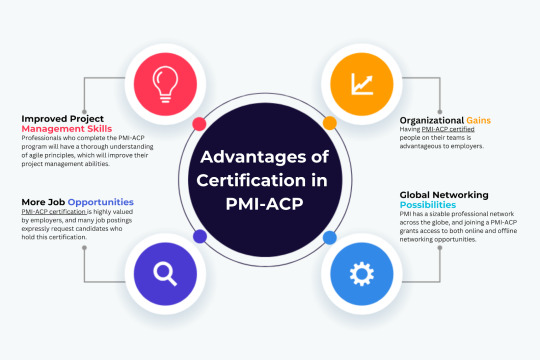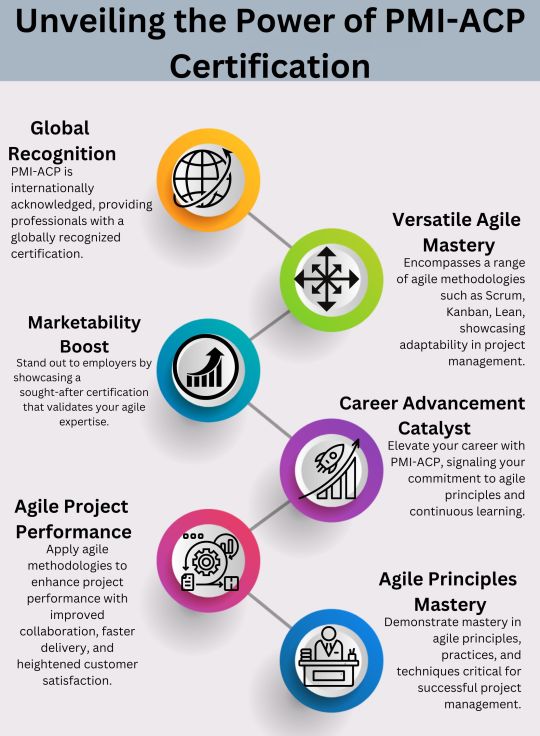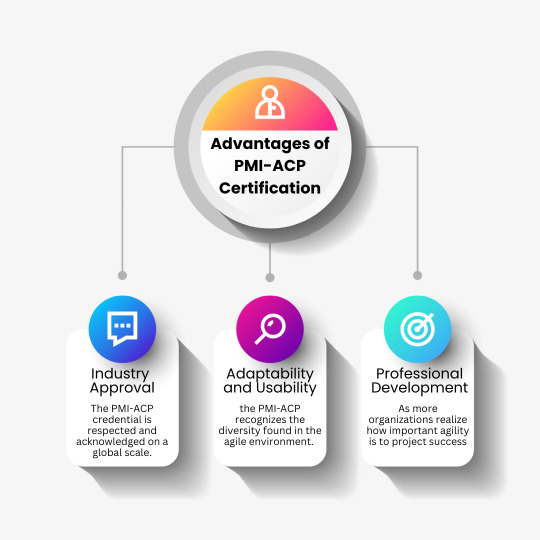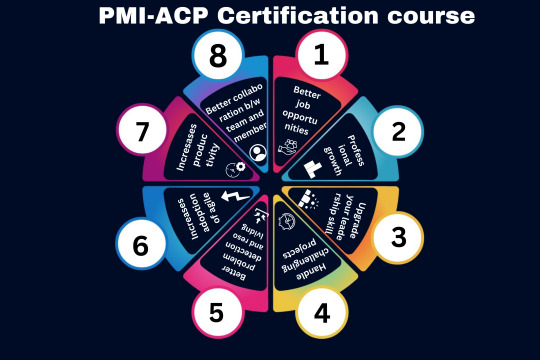#pmi-acp
Explore tagged Tumblr posts
Text
Acquiring Certification in PMI-ACP and Gaining Knowledge about Agile Project Management
First of all,
The dynamic corporate climate of today necessitates ongoing change, and innovation is essential. This makes traditional project management methodologies inadequate. Agile approaches have become a potent remedy, allowing companies to produce value in a rapid, iterative fashion and adjust swiftly. Professionals use certificates like the PMI-Agile Certified Practitioner (PMI-ACP), which not only confirms their competence but also gives them the tools they need to lead successful agile projects, to traverse this agile terrain.
Recognizing PMI-ACP:
To meet the increasing need for agile experts, the Project Management Institute (PMI) created the Agile Certified Practitioner (ACP) certification. The internationally recognized PMI-ACP accreditation attests to a person's competence in a range of agile approaches and practices. It covers a wide range of agile methodologies and transcends particular frameworks like Scrum or Kanban.
The PMI-ACP: Why?
Versatility in Agile Practices: The PMI-ACP is a complete certification for individuals who are knowledgeable in a range of techniques, as it is not restricted to any specific agile methodology. This adaptability is essential in the varied business environment of today, since various projects could profit from various agile frameworks.
Global Recognition: PMI is an organization with worldwide recognition, and PMI-ACP is highly valued in the global employment market. Obtaining this certification not only attests to your agile abilities but also lets potential employers know that you follow strict project management guidelines.
Career Advancement: With more companies using agile techniques, there is a growing need for qualified agile practitioners. Whether you want to go up the corporate ladder or move into a more agile-centric role, PMI-ACP can help you advance professionally and open doors to new employment prospects.
actual Application: The PMI-ACP places a strong emphasis on actual application rather than merely theory. Agile principles and practical experience are required to be demonstrated throughout the certification process, guaranteeing that certified practitioners are not only aware but also able to use their abilities in challenging project circumstances.
What Makes a PMI-ACP Certified Professional?
Hours of Education: Candidates need to have completed a minimum amount of agile education in order to be qualified for the PMI-ACP. This prerequisite guarantees that candidates seeking certification have a solid grasp of agile principles.
Agile Project Experience: A key component of PMI-ACP is practical experience. In order to demonstrate their practical experience implementing agile approaches, candidates must provide a specific amount of hours spent working on agile project teams.
PMI-ACP Exam: Candidates are assessed on a range of agile domains in this extensive test. Adaptive Planning, Stakeholder Engagement, Agile Principles and Mindset, Value-Driven Delivery, Team Performance, Problem Detection and Resolution, and Continuous Improvement are some of these domains.
Sustaining Certification: In order to keep their PMI-ACP certification, professionals need to earn a specific amount of Professional Development Units (PDUs) and continue their agile education. This guarantees that qualified practitioners remain current with the most recent advancements in agile methodologies.
Advantages of Certification in PMI-ACP:
Improved Project Management Skills: Professionals who complete the PMI-ACP program will have a thorough understanding of agile principles, which will improve their project management abilities. This involves the capacity to promote cooperation, adjust to shifting needs, and produce value incrementally.

More Job Opportunities: PMI-ACP certification is highly valued by employers, and many job postings expressly request candidates who hold this certification. Including PMI-ACP on your CV can help you stand out from the competition and improve your chances of getting invited for interviews for positions that focus on agile.
Global Networking Possibilities: PMI has a sizable professional network across the globe, and joining a PMI-ACP grants access to both online and offline networking opportunities. By interacting with other certified practitioners, you can remain in touch with the dynamic agile community, exchange experiences, and pick up tips from others.
Organizational Gains: Having PMI-ACP certified people on their teams is advantageous to employers. These people are a treasure mine of agile knowledge and techniques, which helps to enhance stakeholder participation, project success rates overall, and project delivery efficiency.
In summary:
Within the rapidly evolving field of project management, where flexibility and quick thinking are critical, PMI-ACP stands out as a credential that transcends particular agile frameworks. In order to ensure that trained practitioners can successfully manage the intricacies of today's dynamic corporate environment, it encompasses a holistic approach to agile methods. The PMI-ACP credential will help you advance your career and become a valued asset in the field of agile project management, regardless matter whether you're an experienced project manager trying to improve your abilities or a newbie hoping to make your mark in the agile landscape.
0 notes
Text
Transform Your Career with PMI Agile Certified Practitioner (PMI-ACP)®
Looking to level up your project management skills?

Embrace agility with the PMI Agile Certified Practitioner (PMI-ACP)® training at @advisedskills.
Boost your career, increase your versatility, and adapt to change with confidence.
Your future in project management awaits!
Register now: https://www.advisedskills.com/courses/project-management/pmi/pmi-agile-certified-practitioner-pmi-acp
#advisedskills#advised skills#classroom training#certification#project management#pmi#pmiacp#pmi-acp
0 notes
Text
Advance Your Agile Skills with Learnovative’s Certified Courses in Hyderabad?
In the rapidly evolving world of Agile project management, having the right certifications can significantly boost your career prospects. Whether you’re aiming to become an Agile coach, transition into enterprise-level consulting, or lead Agile teams effectively, specialized training is essential. Learnovative stands out as a leading provider of Agile certifications, offering expert-led programs like the ICP ENT course in Hyderabad, PMI ACP course in Hyderabad, and ICP CAT course in Hyderabad. These courses are tailored to meet the growing demand for skilled Agile professionals and are designed to equip learners with practical tools, frameworks, and coaching techniques to succeed in Agile-driven environments. The ICP ENT course in Hyderabad (ICAgile Certified Professional in Enterprise Coaching) is specially designed for experienced Agile coaches, consultants, and senior leaders. It focuses on building capabilities to coach at the enterprise level and drive Agile transformations across departments and organizational systems. Participants in this course learn how to identify organizational impediments, facilitate long-term change, and support leadership teams in adopting Agile mindsets. Learnovative's unique delivery approach ensures that learners gain practical insights through role-plays, case studies, and real-world scenarios. If you’re aiming to enhance your influence and support enterprise-level Agile adoption, the ICP ENT course in Hyderabad is your best pathway forward.
Meanwhile, the PMI ACP course in Hyderabad caters to project managers and Agile practitioners who want to earn a globally recognized certification from the Project Management Institute (PMI). The PMI Agile Certified Practitioner (PMI-ACP) credential demonstrates your ability to use Agile tools and techniques across a variety of projects. The training curriculum offered by Learnovative combines Scrum, Kanban, Lean, XP, and TDD in accordance with PMI principles. With expert trainers, mock tests, and one-on-one mentoring, Learnovative ensures a high pass rate for the PMI ACP course in Hyderabad. If you are preparing to lead Agile projects and want to stand out in the job market, this course is an ideal investment in your future.
Another cornerstone of Learnovative’s Agile curriculum is the ICP CAT course in Hyderabad (ICAgile Certified Professional in Coaching Agile Transitions). This course is intended for professionals who aim to become Agile change agents within their organizations. It covers how to design and lead change efforts, engage stakeholders, and create environments that support continuous improvement. The ICP CAT course in Hyderabad enables learners to develop strong facilitation and coaching skills, making them effective change leaders. Learnovative’s training program emphasizes practical application and encourages participants to develop real transformation strategies during the course.
Learnovative is distinguished by its strong commitment to quality and student success. All training sessions are conducted by highly experienced Agile coaches who provide personalized guidance and support. Whether you choose the ICP ENT course in Hyderabad, the PMI ACP course in Hyderabad, or the ICP CAT course in Hyderabad, you will benefit from hands-on learning, exam preparation, and post-training career support. The institution also offers flexible batch timings, online and classroom options, and affordable pricing to meet the needs of working professionals.
In conclusion, Learnovative offers a powerful combination of expertise, structure, and support to help you accelerate your Agile journey. If you're seeking to upskill and lead Agile initiatives at different levels, enrolling in the ICP ENT course in Hyderabad, PMI ACP course in Hyderabad, or ICP CAT course in Hyderabad can provide you with the advantage you require in the cutthroat employment market of today. Take the next step with Learnovative and transform your career with industry-leading Agile certifications.
0 notes
Text
Embrace Change
The business environment is constantly evolving due to factors such as process reengineering, digitization, agile initiatives, and remote work. Adaptability is essential for survival and success.
Adaptability is Crucial
A business analyst working on a project for a retail company might have to quickly adapt their analysis and recommendations based on sudden changes in consumer behavior due to a new trend or economic event. Flexibility in approach helps provide relevant insights.

#business analysis#business analyst#institute i4#institute_i4#cbap certification#ecba certification#ccba certification#PMI-PBA certification#PMI-ACP certification#cbda certification#iiba aac certification
1 note
·
View note
Text

Boost Your Agile Career with PMI-ACP® Training
Advance your Agile expertise with PMI-ACP® Training! This globally recognized certification equips you with in-depth knowledge of Agile methodologies, including Scrum, Kanban, Lean, and XP. Ideal for project managers, Scrum Masters, and Agile practitioners, this training enhances your ability to lead Agile teams and manage projects effectively. Gain hands-on experience and increase your career prospects. Enroll today to take the next step in Agile project management!
0 notes
Text
5 Agile courses that could make your Career
The pandemic has forced global organizations to change the way they think and plan. The global scenario saw a major shift and the companies had to re-strategize to survive and stay ahead of the competition. Leading companies are now looking for professionals who have the knowledge and the skill to lead an organization with the Agile approach. Agile project management courses or pmi acp certification can be a sure-shot way to take a lead.
Upskilling is important, especially in highly competitive industries like software development. Therefore, to stay ahead in the game an individual must constantly improve his skill and knowledge to stay ahead in the game.
Many Agile certifications are available and it can be quite a task to choose just one. Today, we will discuss 5 Agile courses that could help you climb the career ladder quickly. These courses are high in demand and will also improve your earning potential.
Let us now have a look at the top 5 Agile Project management certifications -
PMI Agile Certified Practitioner (PMI-ACP) - It is one of the best courses to obtain an Agile certification. It is beneficial for professionals who want to improve their knowledge about the practical application of concepts and techniques of Agile. It is considered to be a golden standard for assessing competency in Agile concepts. The marketability increases and the since it is a very high-in-demand course there is an increase in professional growth as well. This course covers multiple Agile approaches like Scrum, Lean, Kanban, test-driven development, and Extreme Programming. PMI-ACP certification helps in improving versatility. The PMI-ACP certification is ideal for professionals like Agile coaches, project managers, product owners, and project planners. To maintain this certification, a candidate must, every three years must obtain 30 PDUs or professional development units in Agile topics. A candidate must possess 8 months of Agile experience in the last three years to apply for this course. Other requirements include 21 training hours in Agile practices, a secondary degree, and a year of general project experience in the last five years. And also best practices in this coure you can enroll to EDUHUBSPOT , PMI-ACP bootcamp.
Agile Project Management or Agile PM - This course combines the practices of Agile methodology as well as the principles of project management. The Agile PM certification is globally recognized and proves a candidate's ability to adhere to Agile principles in project management in an Agile-focused environment. This course covers various aspects like how to successfully lay the foundation of an Agile project and also prepares you for the Foundation exam. This course is great for professionals who want to become Agile Project managers and also for those who are practicing project managers. An individual who has passed this course will be able to differentiate between different management styles that are needed for a project within an organisation. He will also be able to adapt better to the constantly changing business environment. He will be able to communicate better and also be flexible to accommodate projects to the timescale and budget. Although, there are no basic requirements for these exams one can appear for the Practitioner exam only after clearing the Foundation exam.
Certified Scrum Master (CSM) by Scrum Alliance - CSM is a Scrum certification that is recognized worldwide. This can help you learn the Scrum framework thoroughly and how to apply its principles in the real world. In an organisation, a Scrum Master is a member who creates a productive environment and helps others understand the Scrum principles effectively. The popularity of this course can be gauged from the fact that almost 1 million plus CSM certifications have been issued by the Scrum Alliance. This course is ideal for program managers, data scientists, HR representatives project managers, IT managers, quality assurance staff, and Scrum team members. In this course, one can learn about the Scrum framework and other aspects like team accountabilities and artifacts. After this course, a Scrum master will also be able to assess any roadblocks that are hindering the progress of the project.
Certified Scrum Product Owner or CSPO by Scrum Alliance - It is a globally recognised Scrum certification in the field of product development and ownership. In the world of product development product owner is a highly emerging job. It is the job of a product owner to decide what valuable product will the team be creating next. This course will not only teach you new ways to learn about your customers to bring value to them but also teach you how to manage several exceptions of different stakeholders at once. This certification can give you a deeper understanding of the business aspect of the project. A CSPO makes the vital decision about what product will be created and ensures that a valuable product reaches the customer. A Certified Scrum Product Owner becomes a part of the global community of Agile practitioners. This means that most companies are looking for certified product owners and a CSPO certification will help with that.
Professional Scrum Master or PSM from Scrum.Org - This is also quite a popular course in Scrum in the field of Agile. It equips the individual with thorough knowledge of the Scrum framework and also its application in solving real-world complexities. The certificate is valued because it requires the candidate to demonstrate practical knowledge of the subject as well. There are three different levels of Professional Scrum Master -
Professional Scrum Master I - People who take this certification have a basic mastery of Scrum. PSM I holders can demonstrate that they have an understanding of Scrum and they can apply Scrum in Scrum teams.
Professional Scrum Master II - PSM II holds an advanced level of mastery in Scrum concepts. They have a deeper understanding of the underlying Scrum principles.
Professional Scrum Master III - This is the most advanced level of Scrum mastery. Individuals who have this level of PSM can use their knowledge extensively in various complex organisational situations.
Benefits of pursuing Agile Certificate courses -
Agile has become the backbone of operations in numerous global organisations. Having an Agile certification will put your multiple steps ahead of your competitors. There are some very clear benefits of pursuing courses in Agile Project management. As a certified Agile project manager, one can deliver consistent value to the stakeholders throughout the project, respond to changes with flexibility, and also be able to communicate with the team and the stakeholders with ease. A certified project manager will be able to manage the daily-stand ups better and since the roles are very clearly defined there is better control over resources like time, cost, and money.
#pmi acp certification#Agile project management courses#PMI-ACP bootcamp#bestAgile project management courses
0 notes
Text
PMI-ACP Certification Training: Is It Worth the Investment?
In today’s rapidly evolving business environment, Agile methodologies have become a cornerstone for organizations seeking to deliver products and services faster, with higher quality, and with greater adaptability to change. As a result, Agile certifications have gained immense popularity among professionals looking to enhance their careers. Among these, the PMI-ACP (Agile Certified Practitioner) certification stands out as a highly respected credential offered by the Project Management Institute (PMI). But with the time, effort, and money required to obtain it, many professionals wonder: Is PMI-ACP certification training worth the investment? Let’s explore the key factors that make this certification a valuable asset for your career.

Growing Demand for Agile Professionals
The demand for Agile professionals continues to rise as more organizations adopt Agile methodologies to stay competitive. According to numerous industry reports, Agile project management has become the preferred approach in sectors ranging from software development to finance, healthcare, and beyond. The PMI-ACP certification demonstrates that you have a comprehensive understanding of Agile principles and practices, making you a highly attractive candidate for employers.
By earning the PMI-ACP certification, you position yourself as a knowledgeable and experienced Agile practitioner, capable of leading Agile teams and driving successful project outcomes. This credential can significantly enhance your job prospects, opening doors to new opportunities in a variety of industries.
Comprehensive Coverage of Agile Practices
One of the key advantages of PMI-ACP certification training is its comprehensive coverage of Agile methodologies. Unlike other certifications that focus on a single framework, the PMI-ACP covers a broad spectrum of Agile approaches, including Scrum, Kanban, Lean, Extreme Programming (XP), and more. This diverse knowledge base allows you to apply the most appropriate Agile practices to different project scenarios.
Through PMI-ACP training, you gain a deep understanding of how to implement Agile principles effectively, manage project risks, and deliver value continuously. This holistic approach to Agile project management not only improves your skills but also makes you a more versatile and adaptable project manager, capable of handling a wide range of projects.
Increased Earning Potential
One of the most compelling reasons to invest in PMI-ACP certification training is the potential for increased earning power. Certified Agile practitioners often command higher salaries than their non-certified counterparts. According to PMI’s "Earning Power: Project Management Salary Survey," professionals with PMI-ACP certification typically earn a significant premium over those without this credential.
The certification can also lead to better job opportunities, promotions, and financial incentives, as organizations recognize the value that certified Agile practitioners bring to their teams. Over time, the financial rewards of PMI-ACP certification can far outweigh the initial investment in training and exam fees.
Enhanced Skills and Career Growth
PMI-ACP certification training is designed to equip you with the practical skills needed to manage Agile projects successfully. The training covers essential topics such as Agile principles and mindset, value-driven delivery, stakeholder engagement, team performance, adaptive planning, and problem detection and resolution.
These skills are not only applicable to Agile environments but also valuable in any project management role. By completing PMI-ACP training, you demonstrate your commitment to continuous learning and professional development, which can lead to greater career advancement and recognition within your organization.
Global Recognition and Credibility
The PMI-ACP certification is recognized globally as a mark of excellence in Agile project management. Earning this credential from a reputable organization like PMI enhances your credibility as a project management professional. Employers and clients worldwide respect PMI certifications, making PMI-ACP a powerful asset whether you’re seeking opportunities locally or internationally.
This global recognition means that your PMI-ACP certification will be valuable no matter where your career takes you, giving you the flexibility to work in different industries and regions.
ROI of PMI-ACP Certification Training
When considering whether PMI-ACP certification training is worth the investment, it’s important to think about the return on investment (ROI). The benefits of PMI-ACP certification, including better job prospects, higher earning potential, and enhanced skills, all contribute to a strong ROI. Additionally, the knowledge and skills gained from PMI-ACP training can lead to more successful projects, which can positively impact your organization’s bottom line.
While the initial cost of PMI-ACP certification training may seem significant, the long-term benefits make it a worthwhile investment in your professional future. As you advance in your career, the value of this certification will continue to grow, providing you with ongoing returns.
Conclusion
PMI-ACP certification training is indeed worth the investment for professionals looking to advance their careers in Agile project management. With the growing demand for Agile expertise, the comprehensive knowledge base provided by PMI-ACP training, the potential for increased earnings, and the global recognition of the certification, this credential offers substantial benefits that far outweigh the initial costs. By investing in PMI-ACP certification, you are not only enhancing your skills and career prospects but also positioning yourself as a leader in the ever-evolving world of Agile project management.
0 notes
Text
PMI ACP Certification Training - Agile Certification Courses | Learnovative
Learnovative provides top-notch PMI ACP certification training, offering comprehensive Agile certification courses designed to prepare you for the PMI Agile Certified Practitioner exam. Our expert instructors and interactive learning environment ensure you gain the skills and knowledge needed to succeed. Enroll in our Agile training program today and take the next step in your Agile career!
The PMI Agile Certified Practitioner (PMI-ACP) is provided by internationally recognized body PMI (Project Management Institute). PMI-ACP formally recognizes your understanding of agile values, principles and your skills with agile methods. You can show your peers, employers, and stakeholders that your agile knowledge is in depth.
call now : 099499 94949
#PMI ACP Certification#Agile Certification#Agile Training#CSM#CSPO#ACSM#ACSPO#CSMtraininginHyderabad#CSMtrainingcoursesinHyderabad#ScrumMastertraininginHyderabad#ScrumMastercertificationinHyderabad#CertifiedScrumMastercertificationinHyderabad#CertifiedScrumMastercertificationtraininginHyderabad#CSMcertificationinHyderabad#CertifiedScrumTrainerinHyderabad#CertifiedAgileScrumTrainerinHyderabad#CertifiedEnterpriseCoachinHyderabad#CertifiedTeamCoachforCSMinHyderabad#CertifiedTeamCoach#CSPOinHyderabad
0 notes
Text

Embark on a transformative journey in project management with the PMI-ACP certification, your key to unlocking the dynamic realm of agile methodologies. This globally recognized certification empowers professionals to master diverse agile frameworks like Scrum and Lean, providing a versatile skill set for navigating the ever-changing landscape of project management.
0 notes
Text
Scrum Master Certification: The Way to Unlock Agile Performance
The Project Management Institute (PMI) has established a certification that represents the dynamic and ever-evolving nature of the project management business, where adaptability and responsiveness are crucial. The PMI-ACP credential is specifically created to provide professionals with the necessary knowledge and abilities to succeed in agile work environments. We'll examine the importance of the PMI-ACP certification, its advantages, and the path to becoming an agile expert in this blog post.
Taking an Agile Approach to Project Management
Even while they work well in some situations, traditional project management techniques frequently find it difficult to keep up with the quickly evolving needs and expectations of modern projects. Presenting agile methodologies: a collection of ideas and methods that place an emphasis on adaptability, teamwork, and ongoing development. Agile approaches are especially well-suited for industries characterized by unpredictability and rapid innovation, as they allow teams to respond swiftly to changes and provide value incrementally.
PMI created the PMI-ACP certification to certify professionals' proficiency with agile techniques and practices. It highlights the value of adaptability in project management and presents trained professionals as capable leaders who can handle the intricacies of contemporary projects.
Important Elements of PMI-ACP Certification
1. Qualifications and Needs
Candidates must have both agile project management and project management experience in order to be eligible for the PMI-ACP certification. An associate's degree, global equivalent, or high school diploma counts as a secondary degree and calls for 21 hours of study in agile project management. Applicants with a bachelor's degree or above must have worked on at least eight agile projects within the previous three years in addition to twelve months of general project management experience.
2. Exam Structure
An extensive examination of a candidate's understanding and use of agile methods and principles is the PMI-ACP exam. Exam topics include a wide range of agile methodologies, such as test-driven development (TDD), extreme programming (XP), Scrum, Kanban, Lean, and others. With three hours to finish the exam, students must answer 120 multiple-choice questions. Being inclusive—rather than concentrating on a single framework, the PMI-ACP certification acknowledges and certifies a wide range of agile methodologies—is a major benefit.
3. Agile Practice Domains
Each of the seven areas that make up the PMI-ACP exam represents a significant area of agile practices:
Value-Driven Delivery with an Agile Mindset and Principles
Adaptive Planning, Stakeholder Engagement, and Team Performance
Problem Identification and Fixing
Constant Enhancement (People, Process, and Product)
Gaining success in the PMI-ACP test and, more significantly, in successfully
implementing agile techniques in real-world projects require a thorough understanding of these topics.
Advantages of PMI-ACP Certification:
1. Industry Approval
The PMI-ACP credential is respected and acknowledged on a global scale. Obtaining this certification shows a professional's dedication to lifelong learning and agile concept mastery. It acts as a badge of honor, indicating to colleagues and employers that the certified person has the abilities needed to succeed in agile project management.

2. Adaptability and Usability
The adaptability of the PMI-ACP certification to different agile techniques is one of its most notable advantages. In contrast to certifications centered around a single framework, the PMI-ACP recognizes the diversity found in the agile environment. This makes it the perfect option for professionals operating in various sectors and settings where a variety of agile methodologies may be applied.
3. Professional Development
As more organizations realize how important agility is to project success, there is a growing need for agile practitioners. Having the PMI-ACP certification might help you progress in your career because businesses are looking for people who can lead and deliver projects in an agile manner.
Success Strategies for the PMI-ACP Certification Process
1. Comprehensive Planning
There are many subjects covered in the PMI-ACP exam, therefore being well-prepared is crucial. Focus on comprehending the concepts and procedures related to each area, using the PMI-ACP Examination Content Outline as a guide. To make sure you cover all the required information, think about signing up for a respectable PMI-ACP test preparation course.
2. Real-World Experience
Experience in the real world is just as important as understanding the theoretical underpinnings of agile processes. Get practical experience by putting agile ideas to use in real-world projects. This helps you comprehend the material better and gives you real-world examples to refer to when taking the test.
3. Remain Current
The agile landscape is always changing, with new approaches and techniques appearing on a regular basis. Engage in agile communities, read trade journals, and go to conferences to stay up to date on the most recent advancements in the field. This dedication to lifelong learning will help you prepare better for your exams and improve your ability to use agile practices in your projects.
In summary
The evolution of project management certifications has advanced significantly with the introduction of the PMI-ACP credential. Through acknowledging the variety of agile approaches and encouraging a comprehensive comprehension of agile principles, PMI has established the PMI-ACP as a useful tool for professionals hoping to succeed in the dynamic field of project management. The PMI-ACP certification provides a path to improve your abilities, advance your career, and support agile project success in today's business environment, regardless of your experience level in the industry. Accept change, obtain your PMI-ACP certification, and use your position as a catalyst to influence improvement in the project management industry.
0 notes
Text
🚀 Get Certified with Advised Skills – Upcoming Training Sessions!
Looking to enhance your skills and earn globally recognized certifications? Join our upcoming instructor-led courses delivered live online in Europe:
📅 14 April – PMI-ACP® 📅 14 April – PMI-CAPM® 📅 23 April – Open Agile Architecture™ 📅 23 April – IT4IT™ 📅 28 April – Leading SAFe® 📅 5 May – PMI® PMP® Exam Prep 📅 5 May – TOGAF® EA 📅 12 May – ArchiMate® 3
🎓 All training includes certification exams. 🌍 Delivered by experienced trainers. ✅ Confirmed dates – secure your seat today!
🔗 Learn more and register: https://www.advisedskills.com/

#advised skills#certification#advisedskills#training#leading safe#togaf#archimate3#it4it#pmi acp#project management
1 note
·
View note
Text
Unleashing Agility: A Deep Dive into the PMI Agile Certified Practitioner (PMI-ACP) Certification

Introduction
Success in the dynamic and rapidly evolving field of project management has become contingent upon the adoption of agile approaches. When businesses start to focus more on agility, professionals who have the appropriate training and credentials stand out from the competition. Those who want to become experts in agile project management can find guidance in the PMI-ACP certification, which stands for Project Management Institute Agile Certified Practitioner. This blog post explores the importance of PMI-ACP, outlining its main characteristics, advantages, and the reasons project managers navigating today's changing project environment need to have it.
The Evolution of Agile: By providing a flexible and cooperative approach to project execution, agile approaches have completely changed the landscape of project management. This section examines the development of agile practices, emphasizing how these practices have transformed project management techniques and the reasons behind the growing use of agile frameworks by enterprises.
An Extensive Analysis of PMI-ACP: What Makes PMI-ACP Unique? A thorough description of the PMI-ACP certification is given in this part, along with information on its requirements, scope, and the extensive test that assesses applicants on a wide range of agile practices, principles, tools, and methodologies. It will become evident to readers what is required to obtain this esteemed accreditation.
Versatility Across Agile Frameworks: The adaptability of PMI-ACP is one of its distinctive qualities. PMI-ACP embraces a holistic approach, enabling professionals to apply agile techniques across numerous methodologies such as Scrum, Kanban, Lean, and more. This is in contrast to certificates that are linked to a particular agile framework. The ability to adapt to different agile contexts is what makes PMI-ACP holders skilled at navigating them, as this section explains.
Impact in the Real World: How does PMI-ACP lead to success in the Real World? The concrete effects of PMI-ACP on careers in project management are highlighted in this section. Readers will comprehend the real-world advantages of possessing a PMI-ACP certification, ranging from enhanced project outcomes to more job options and professional development.
Getting Ready for Success: Do you want to become a PMI-ACP?
Exam preparation advice and insights are provided in this section. From suggested reading lists and instructional materials to methods for grasping agile principles, readers will have insightful knowledge about the preparatory process.
Community and Networking: Being a PMI-ACP member gives you access to a worldwide community of agile practitioners, going beyond just a certification. The significance of networking, sharing knowledge, and maintaining connections with like-minded professionals in the agile arena is emphasized in this section.
Conclusion
PMI Agile Certified Practitioner (PMI-ACP) credential is revolutionary for project managers negotiating the intricacies of modern projects. Accepting agility is not merely a fad; it is essential to the success of projects. The PMI-ACP certification is a potent indicator of one's competence with agile approaches and provides a pathway to becoming a highly sought-after agile project management specialist, particularly in light of the growing demand from organizations for agile leaders.
0 notes
Text
Best PMI ACP Course Training Institute in Hyderabad | Learnovative
Learnovative is a leading PMI ACP training institute in Hyderabad offering expert-led sessions, real-world case studies, and flexible schedules. Join the best PMI ACP training institute in Hyderabad and boost your career with our PMI ACP course training institute.
#PMI ACP training institute in Hyderabad#best PMI ACP training institute in Hyderabad#PMI ACP course training institute in Hyderabad
0 notes
Text
PMI ACP certification exam, as in all other exams, you must test yourself with as much as PMI ACP sample exam questions as possible. This is actually a common rule for any exams. The more you practice the more you sharpen your skills.
0 notes
Text


















🤝Hand holding support is available with 100% passing assurance🎯 📣Please let me know if you or any of your contacts need any certificate📣 📝or training to get better job opportunities or promotion in current job📝 📲𝗖𝗼𝗻𝘁𝗮𝗰𝘁 𝗨𝘀 : Interested people can whatsapp me directly ✅WhatsApp :- https://wa.aisensy.com/uemtSK 💯Proxy available with 100% passing guarantee.📌 🎀 FIRST PASS AND THAN PAY 🎀 ISC2 : CISSP & CCSP Cisco- CCNA, CCNP, Specialty ITILv4 CompTIA - All exams Google-Google Cloud Associate & Google Cloud Professional People Cert- ITILv4 PMI-PMP, PMI-ACP, PMI-PBA, PMI-CAPM, PMI-RMP, etc. EC Counsil-CEH,CHFI AWS- Associate, Professional, Specialty Juniper- Associate, Professional, Specialty Oracle - All exams Microsoft - All exams SAFe- All exams Scrum- All Exams Azure & many more… 📲𝗖𝗼𝗻𝘁𝗮𝗰𝘁 𝗨𝘀 : Interested people can whatsapp me directly ✅WhatsApp :- https://wa.aisensy.com/uemtSK
#ccna#ccnatraining#ccnacertification#cisco ccna#awscloud#aws course#devops#cybersecurity#salesforce#pmp certification#pmp training#pmp course#pmp exam
1 note
·
View note
Text

Experience the PMI-ACP Exam Simulator for free and elevate your Agile certification preparation. This user-friendly tool offers a realistic exam environment with a diverse range of questions, instant feedback, and detailed explanations, tailored to help you succeed in the PMI-ACP exam with confidence.
0 notes